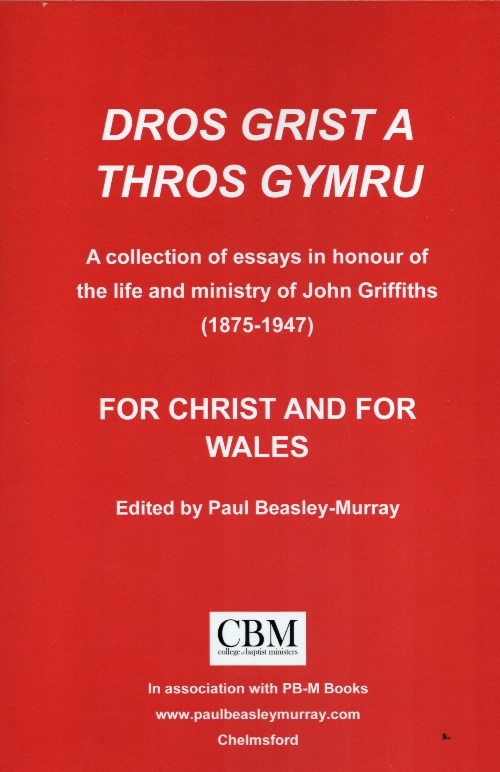For Christ and for Wales - A collection of essays in honour of the life and ministry of John Griffiths (1875 -1947), edited by Paul Beasley-Murray
From coal miner to College Principal, this is a remarkable journey of faith and the book tells a valuable but forgotten story which deserves wider attention
 For Christ and for Wales - A collection of essays in honour of the life and ministry of John Griffiths (1875 -1947)
For Christ and for Wales - A collection of essays in honour of the life and ministry of John Griffiths (1875 -1947)
Edited by Paul Beasley-Murray
College of Baptist Ministers in association with PB-M Books
Reviewed by Peter Stevenson
After ten years working underground in the collieries of North Wales the young John Griffiths set out on his journey into Christian ministry. His ability was evident from the beginning. He was the first student at the Baptist College in Bangor to earn the University’s Bachelor of Divinity degree. After 17 years of fruitful local church ministry, he was appointed as tutor to teach Greek and New Testament at the Baptist College in Cardiff. Having taught there with distinction for 18 years he then served as Principal from 1943 to his death in 1947.
Having myself been Principal of that college from 2011 to 2019, I was aware of John Griffiths whose portrait hangs over the stairs leading up to the library. However, the college’s published histories contain only modest amounts of information about him. So I was pleased to find out much more about one of my predecessors from a collection of essays edited by Paul Beasley-Murray - Dros Grist A Thros Gymru / For Christ and for Wales.
Based on Adrian Walters’ research into John Griffiths’ early life and his ministry at Ammanford (1908-1925), the first essay paints a vivid picture of an impressive local church ministry driven by the conviction that the gospel of Jesus Christ has the power to transform individuals and societies. It concludes that his Ammanford ministry ‘covered not just preaching, pastoral care, service to the community together with all the many other tasks arising from leading a large church with over 600 members, but also political activism, involvement in wider Welsh Baptist life, and contributions to all kinds of Welsh cultural life’ (p. 32).
In the next essay Paul Beasley-Murray focuses on John Griffiths’ service as tutor and then as Principal at the Baptist College. Something which particularly caught my attention was that he was ‘a tutor who never stopped learning’ (p. 37). In today’s constantly changing world, effective ministers still need to be life-long learners committed to their ongoing personal and professional development.
By sharing personal family memories, the essays by Lynette and Gareth Hughes and then by Caroline Beasley-Murray help readers gain a more rounded picture of their grandfather’s life and faith. Those personal reflections are complemented by Densil Morgan’s contribution which places JG’s life in context by offering a comprehensive and perceptive account of the developing culture of Welsh Nonconformity from 1870 to 1945.
As a previous Baptist College Principal, John Weaver is well positioned to identify some of the ways in which ministerial formation has continued to develop since JG’s time. He argues that over the decades ‘training has become more closely aligned with the needs of the churches and the spiritual development of ministerial students’ (p.95).
In a closing chapter Rob James shares the fruits of interviews with some church leaders and reflects on the challenges and opportunities facing Welsh Christianity. Noting some encouraging signs, he urges churches to love one another and to love those who don’t belong to any church. He longs to see more fellowships earning a reputation for Christian integrity and authenticity.
For Christ and for Wales tells a valuable but forgotten story which deserves wider attention. Reflecting on one person’s life and ministry in a particular historical context, provokes searching questions about what effective ministry and mission might look like in today’s challenging contexts. It also prompts questions about which other forgotten stories of faith similarly deserve to be brought out into the light.
Including UK postage and packing it retails at £5. To purchase a copy contact Paul at paulbeasleymurray@gmail.com
The Revd Dr Peter Stevenson is a Senior Research Fellow at Spurgeon’s College and was Principal of the Baptist College in Cardiff from 2011 to 2019
Baptist Times, 23/06/2023